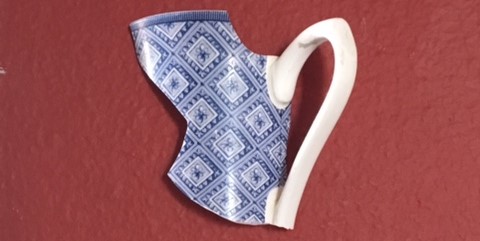Think twice before you dismiss those pieces — or people — that may look jagged or rough.
By Leslie Quintanar
I’ve written about Jerry before — a seasoned world traveler who traversed the globe with a mission to enrich the lives of those he encountered. He exemplifies the second half of that old proverb: “teach a man to fish and you feed him for a lifetime”. He and his wife did that for workers in factories and other blue collar jobs for decades. I’m convinced that if you were to look up social activist in the dictionary, you’d see his face. And no, I don’t mean the flag-burning, angry protesters so often portrayed as activists. I am referring to someone who looks at the world through lenses of gratitude and a desire for connectedness. Someone who seeks to make it better, because in doing so, he is ultimately doing it for the good of all humanity. That’s Jerry. The moment I met him and saw his kind, smiling eyes, warm affect and intuitive ability to understand those around him, I was an ardent fan. I instantly loved his soul and the way it naturally sought out others in efforts to make them believe that they can indeed impact their own little piece of the world.
A Year of Friendship
Over the last year I’ve learned much from him. The highlight of my visits to the community in Portland where he and his wife reside was getting to listen to his unique perspective of life and his insightful commentary on the journey. Each encounter left me contemplating something in my own life that was important and deeply woven into the fabric of my being. He brought that out in me and I watched him masterfully do it in others.
But also over the course of the last year I have watched as he has grappled with something he cannot repair; his wife’s advancing Alzheimer’s. Her cognitive slide (as he calls it) has been growing gradually steeper. She has periods of lucid thought, but the confusion and lack of ability to express herself are slowly taking over her vibrant personality. It breaks his heart. I’ve seen it on his face when I’ve visited and have watched him slowly withdraw from broader community life so he can spend as much time with her as possible.
Gratefulness in the Midst of Immense Trial
Yet despite this obvious sadness, he does not whine or cry or trumpet his suffering to all who will listen. Instead, he remains grateful. Grateful. In the midst of watching the love of his life slip away from him, he remains grateful. Let that sink in a bit. How many of us remain grateful when our coffee order is wrong, we’re stuck in traffic, or cannot eat at our favorite restaurant? I suspect more of us can identify with that than we’d like to admit.
When I had one of my last visits with him, I was sitting in his apartment and we were chatting away about Lee and other things going on in our lives. I noticed he had a small fragment of a broken teacup hanging on his wall (the picture with this article is the one I took that day). Their apartment is filled with art, memories, and items that are full of meaning; naturally, I assumed that the cup must have some meaning as well. I asked him about it and to my surprise he replied that it was simply a coffee cup that had broken and he hung the remaining piece on a vacant nail as he was cleaning it up. He promptly forgot about it and so it still hangs on his wall.
Broken But Not Meaningless
To me this fragment was a lot more than a broken piece of china. In fact, it shouted to me that this is how he views life and has managed to make such an impact on so many. He isn’t willing to throw anyone away; to dismiss them because they aren’t smart enough, strong enough, or savvy enough. In fact, the universal truth that most people are broken in some way seems to be something he intimately understands. His whole life he has chosen to see the brokenness as beautiful and an opportunity for growth. Nowhere is this more evident in his relationship with his wife Lee. Over and over again he has said to me that he is so grateful and thankful that he gets to wake up and see her each day. How many of us — in that same situation — can say we’d react the same? I know I would have a tough time and I suspect most of us feel the same.
As usual I left him that day carrying with me a valuable lesson. On a daily basis I will encounter families, residents, co-workers, and a host of others who are in some way struggling because of some brokenness. As much as I am able, I will remember that broken cup and let it be an emblem to me of the fact that broken can be beautiful and we should never dismiss those pieces that may look jagged or rough. I will seek to highlight them as beautiful even if it isn’t what I expected.
Thank you again, Jerry, for displaying this in such a remarkable way.









